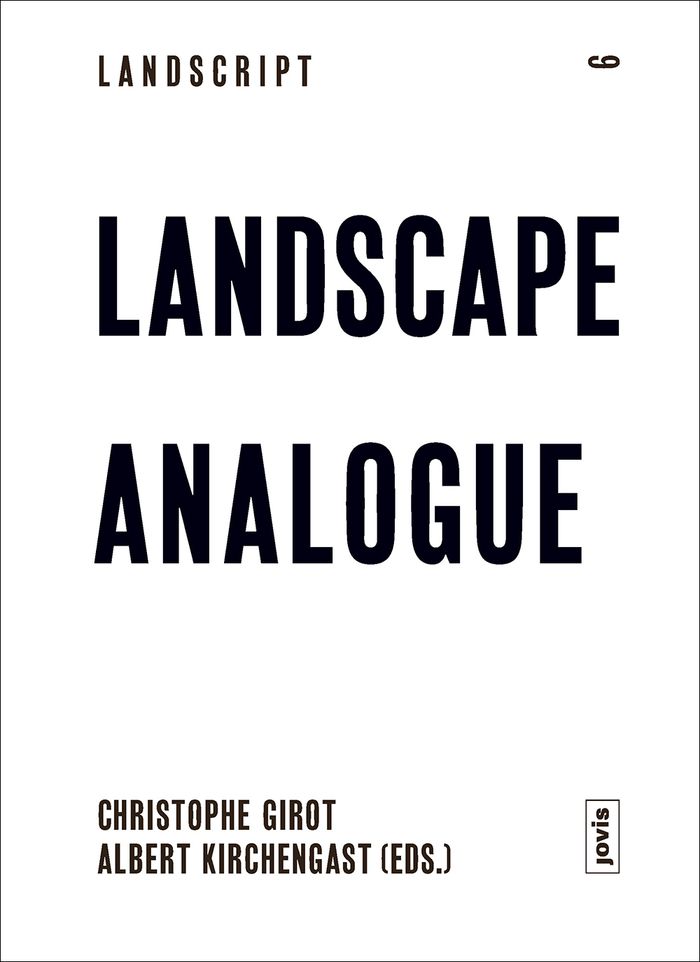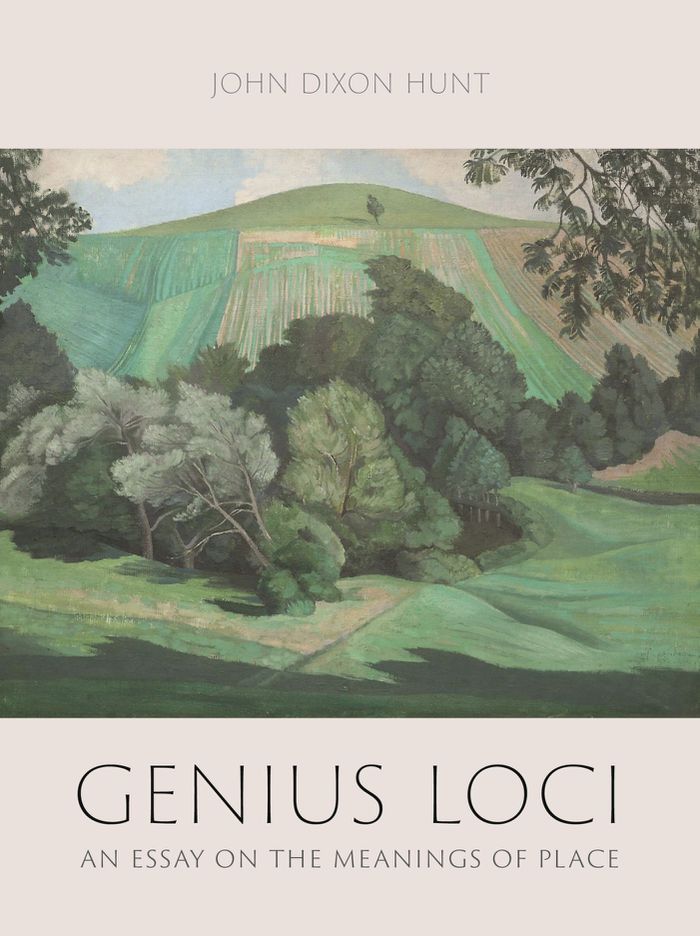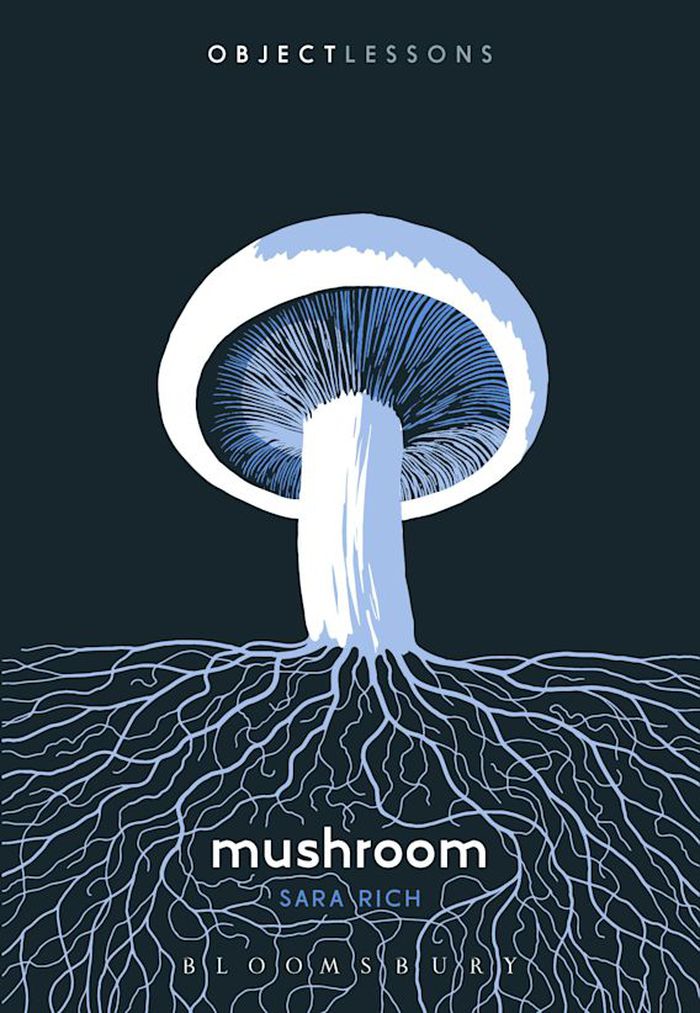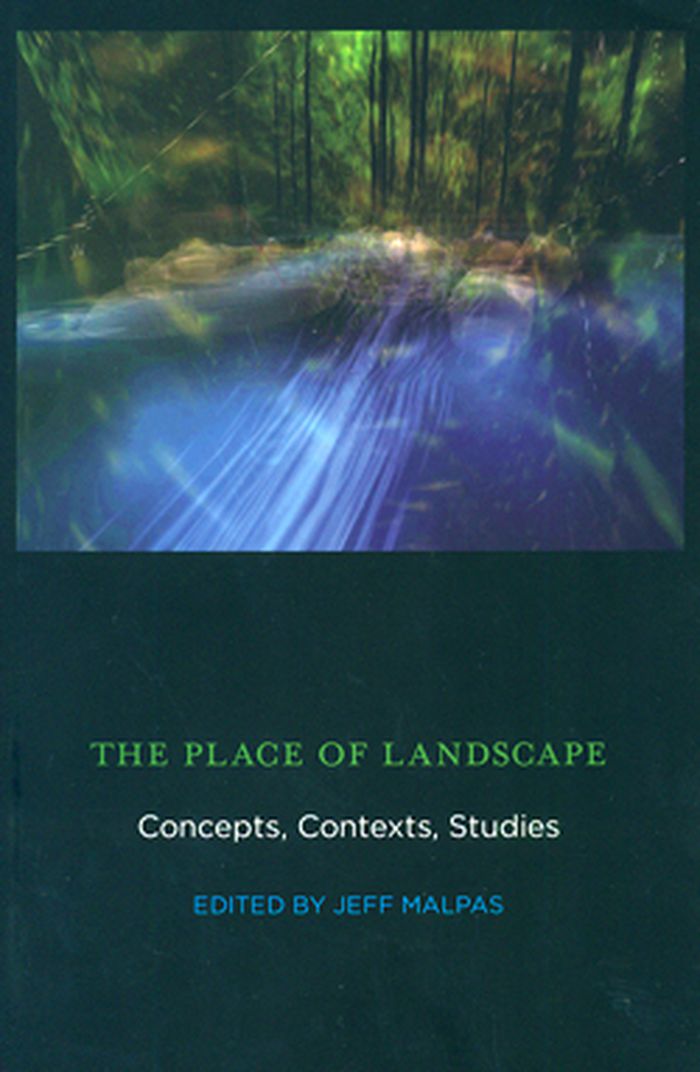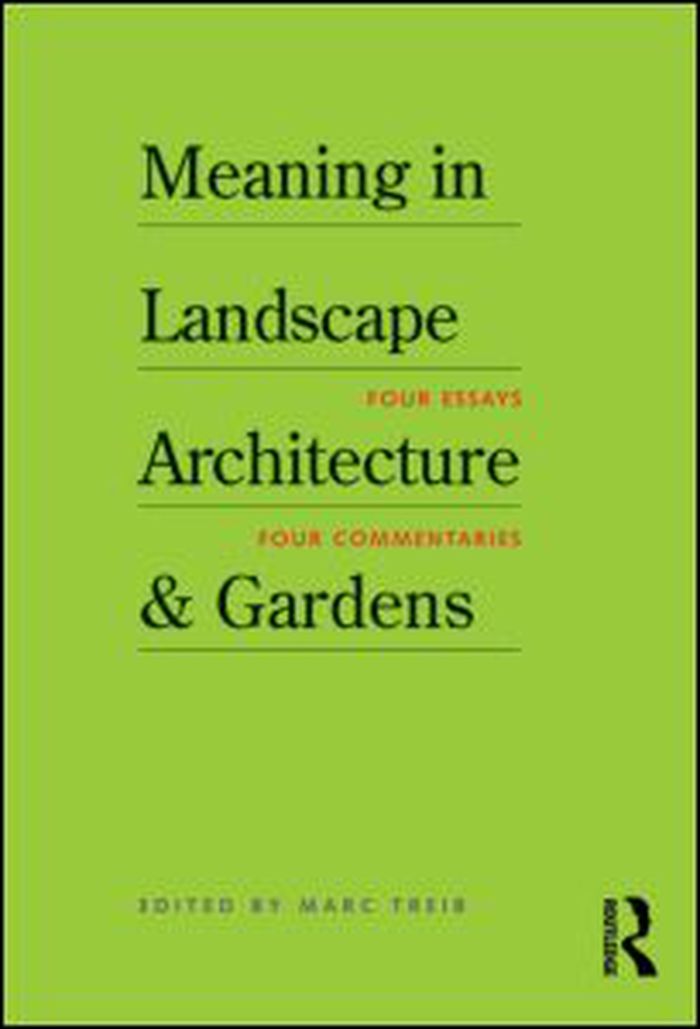livres
$32.95
(disponible sur commande)
Résumé:
Ce livre s'organise autour du propos historique et theéorique du philosophe allemand Joachim Ritter. La thèse de Ritter consiste à montrer que l'émergence de sentiment e esthétique de la nature comme paysage naît du divorce entre l'homme et la nature.
Paysage : fonction de l'esthétique dans la société
Actions:
Prix:
$32.95
(disponible sur commande)
Résumé:
Ce livre s'organise autour du propos historique et theéorique du philosophe allemand Joachim Ritter. La thèse de Ritter consiste à montrer que l'émergence de sentiment e esthétique de la nature comme paysage naît du divorce entre l'homme et la nature.
livres
novembre 1997, Besançon
Théorie du paysage
livres
$57.50
(disponible sur commande)
Résumé:
Publié pour la première fois vers 1634, le "Yuanye" est le premier et le seul ouvrage exclusivement consacré à l'art des jardins que la Chine nous ait légué.
Yuanye : le traité du jardin (1634)
Actions:
Prix:
$57.50
(disponible sur commande)
Résumé:
Publié pour la première fois vers 1634, le "Yuanye" est le premier et le seul ouvrage exclusivement consacré à l'art des jardins que la Chine nous ait légué.
livres
novembre 1997, Besançon
Théorie du paysage
livres
$34.95
(disponible sur commande)
Résumé:
Publié par le Groupe d'étude du XVIIIè siècle de l'Université Libre de Bruxelles.
Études sur le XVIIIè siècle : parcs, jardins et forêts au XVIIIè siècle
Actions:
Prix:
$34.95
(disponible sur commande)
Résumé:
Publié par le Groupe d'étude du XVIIIè siècle de l'Université Libre de Bruxelles.
livres
octobre 1997, Bruxelles
Théorie du paysage
$45.00
(disponible sur commande)
Résumé:
The difficulty of reconciling our basic needs with the long history of cultural landscapes, in all their inherent beauty and sufficiency, has become clear. With our deep trust in modern technology, in progress and in a demanding global lifestyle we have become a real threat to our world. Yet, today the existential and elementary nature of landscapes remains the bearer of(...)
Landscape analogue: About material culture and idealism. landscript #6
Actions:
Prix:
$45.00
(disponible sur commande)
Résumé:
The difficulty of reconciling our basic needs with the long history of cultural landscapes, in all their inherent beauty and sufficiency, has become clear. With our deep trust in modern technology, in progress and in a demanding global lifestyle we have become a real threat to our world. Yet, today the existential and elementary nature of landscapes remains the bearer of a successful metaphor for “balance”. Why not draw—amidst a truly global crisis—conclusions out of our long history of designed nature, of places shaped by skilled labor and a quest for pleasure? This publication seeks to stimulate the “Analogue” dimension as a substantial concept for everyday landscape thinking. In an anthology of interdisciplinary essays, this volume stresses the necessity for a fundamental shift, within the likely framework of a future of restricted resources, a radically different mobility or “hot” cities.
Théorie du paysage
$40.00
(disponible sur commande)
Résumé:
For ancient Romans, genius loci was literally "the genius of the place,"the presiding divinity who inhabited a site and gave it meaning. While we are less attuned to divinity today, we still sense that a place has significance. In this book, eminent garden historian John Dixon Hunt explores genius loci in many settings, including contemporary land art, the paintings of(...)
Genius Loci: An essay on the meanings of place
Actions:
Prix:
$40.00
(disponible sur commande)
Résumé:
For ancient Romans, genius loci was literally "the genius of the place,"the presiding divinity who inhabited a site and gave it meaning. While we are less attuned to divinity today, we still sense that a place has significance. In this book, eminent garden historian John Dixon Hunt explores genius loci in many settings, including contemporary land art, the paintings of Paul and John Nash, travel writers such as Henry James, Paul Theroux, and Lawrence Durrell on Provence, Mexico, and Cyprus, and landscape architects who invent new meanings for a site. This book is a nuanced, thoughtful exploration of how places become more significant to us through the myriad ways we see, talk about, and remember them.
Théorie du paysage
Mushroom (object lessons)
$20.95
(disponible sur commande)
Résumé:
The mushroom is an ordinary object whose encounters with humans are usually limited to a couple of species prepackaged at the grocery store. This book offers mushrooms as much more than a pasta ingredient or trendy coffee alternative. It presents these objects as the firmament for life as we know it, enablers of mystical traditions, menders of minds lost to depression.(...)
Mushroom (object lessons)
Actions:
Prix:
$20.95
(disponible sur commande)
Résumé:
The mushroom is an ordinary object whose encounters with humans are usually limited to a couple of species prepackaged at the grocery store. This book offers mushrooms as much more than a pasta ingredient or trendy coffee alternative. It presents these objects as the firmament for life as we know it, enablers of mystical traditions, menders of minds lost to depression. But it acknowledges, too, that this firmament only exists because of death and rot. Rummaging through philosophical, literary, medical , ecological , and anthropological texts only serves to confirm what the average forager already knows: that mushrooms are to be regarded with a reverence deserving of only the most powerful entities: those who create and destroy, and thrive on both.
Théorie du paysage
$54.95
(disponible sur commande)
Résumé:
This volume explores the conceptual "topography" of landscape: It examines the character of landscape as itself a mode of place as well as the modes of place that appear in relation to landscape. The essays demonstrate that the study of landscape cannot be restricted to any one genre, cannot be taken as the exclusive province of any one discipline, and cannot be(...)
The place of landscape: concepts, contexts, studies
Actions:
Prix:
$54.95
(disponible sur commande)
Résumé:
This volume explores the conceptual "topography" of landscape: It examines the character of landscape as itself a mode of place as well as the modes of place that appear in relation to landscape. The essays demonstrate that the study of landscape cannot be restricted to any one genre, cannot be taken as the exclusive province of any one discipline, and cannot be exhausted by any single form of analysis. What the place of landscape now evokes is itself a wide-ranging terrain encompassing issues concerning the nature of place, of human being in place, and of the structures that shape such being and are shaped by it.
Théorie du paysage
Arctic dreams
$19.95
(disponible sur commande)
Résumé:
Lopez offers a thorough examination of this obscure world - its terrain, its wildlife, its history of Natives and the intrepid explorers who have arrived on their icy shores. But what turns this marvelous work of natural history into a breathtaking study of profound originality is his unique meditation on how the landscape can shape our imagination, desires, and dreams.
Arctic dreams
Actions:
Prix:
$19.95
(disponible sur commande)
Résumé:
Lopez offers a thorough examination of this obscure world - its terrain, its wildlife, its history of Natives and the intrepid explorers who have arrived on their icy shores. But what turns this marvelous work of natural history into a breathtaking study of profound originality is his unique meditation on how the landscape can shape our imagination, desires, and dreams.
Théorie du paysage
Une brève histoire du jardin
$25.95
(disponible sur commande)
Résumé:
Le premier jardin est celui de l'homme ayant choisi de faire cesser l'errance. Il n'y a pas d'époque pour cette étape dans la vie d'un homme ou d'une société. Le premier jardin est vivrier. Le jardin potager est le premier jardin. Il est intemporel car il fonde l'histoire des jardins mais la traverse et la marque profondément dans toutes ses périodes. Le premier jardin(...)
Une brève histoire du jardin
Actions:
Prix:
$25.95
(disponible sur commande)
Résumé:
Le premier jardin est celui de l'homme ayant choisi de faire cesser l'errance. Il n'y a pas d'époque pour cette étape dans la vie d'un homme ou d'une société. Le premier jardin est vivrier. Le jardin potager est le premier jardin. Il est intemporel car il fonde l'histoire des jardins mais la traverse et la marque profondément dans toutes ses périodes. Le premier jardin est un enclos. Il convient de protéger le bien précieux du jardin ; les légumes, les fruits, puis les fleurs, les animaux, l'art de vivre, ce qui, au fil du temps, ne cessera d'apparaître comme le " meilleur ". C'est la façon d'interpréter le meilleur qui, en fonction des modèles de civilisation, va déterminer le style des jardins. La notion de meilleur, de bien précieux, ne cesse d'évoluer. La scénographie destinée à valoriser le meilleur s'adapte au changement des fondamentaux du jardin mais le principe du jardin demeure constant : s'approcher le plus possible du paradis.
Théorie du paysage
$40.95
(disponible sur commande)
Résumé:
While we all live our lives in designed landscapes of various types, only on occasion do we consider what these landscapes mean to us and how they have acquired that significance. Can a landscape architect or garden designer really imbue new settings with meaning, or does meaning evolve over time, created by those who perceive and use these landscapes? What role does the(...)
Meaning in landscape architecture and gardens: Four essays, Four commentaries
Actions:
Prix:
$40.95
(disponible sur commande)
Résumé:
While we all live our lives in designed landscapes of various types, only on occasion do we consider what these landscapes mean to us and how they have acquired that significance. Can a landscape architect or garden designer really imbue new settings with meaning, or does meaning evolve over time, created by those who perceive and use these landscapes? What role does the selection and arrangement of plants and hard materials play in this process and just where does the passage of time enter into the equation? These questions collectively provide the core material for Meaning in Landscape Architecture and Gardens, a compendium of four landmark essays written over a period of twenty years by leading scholars in the field of landscape architecture. New commentaries by the authors accompany each of the essays and reflect on the thinking behind them as well as the evolution of the author’s thoughts since their original publication.
Théorie du paysage
